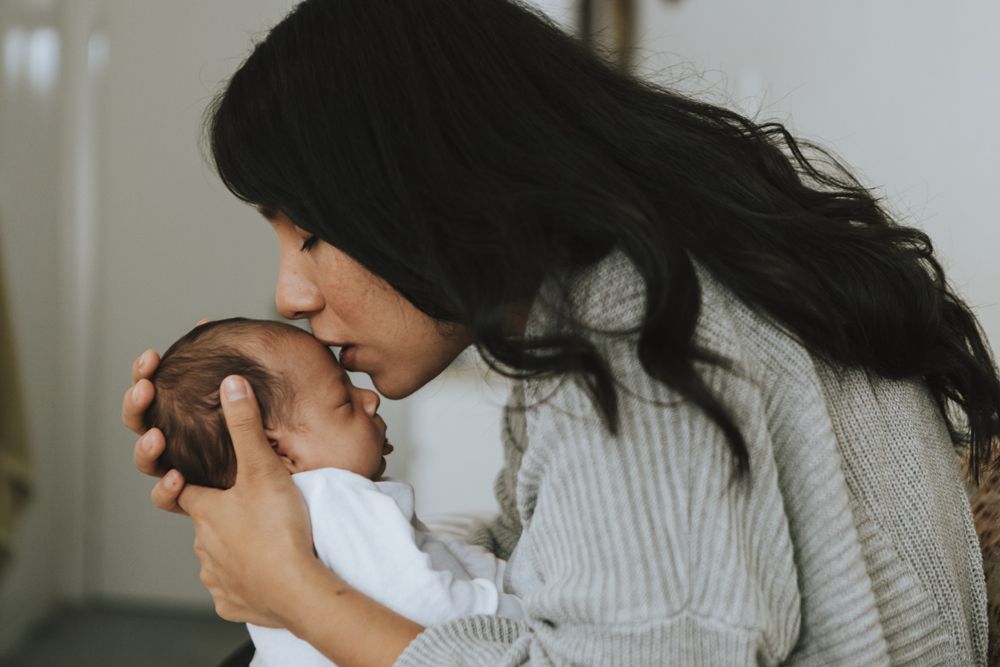So let’s start with the facts about postpartum depression (PPD): it is common.
Studies vary a bit, but somewhere between 1 in 8 and 1 in 6 moms experience PPD. It is caused by a number of physical, emotional, or environmental factors.
Physically, there is a huge surge of hormones before birth and then a huge drop afterward and you are completely sleep deprived and your body is healing and all, ‘wtf just happened here?’
Emotionally there is a lot to adjust to—you may feel overwhelmed and anxious by the responsibility of caring for a newborn or feel out of control of your own life. Or there may be some external conditions contributing to PPD, such as juggling older siblings, financial problems, or lack of family support. Any and all of these things, alone or combined, can contribute to a woman developing PPD.
Symptoms of PPD include pretty serious things like:
- overwhelming sadness
- anxiety
- feelings of inadequacy
- sleeplessness
- and trouble bonding with your baby.
But symptoms of other disorders often present with PPD, too, such as obsessive compulsive disorder or paralyzing anxiety.
Moms may also feel rage, regret, or feel generally numb about everything. There is also a range in intensity with these symptoms—some people feel general melancholy while others are prone to full-on fits of rage. Some women think about hurting themselves; others think about (accidentally or on purpose) hurting their new baby.
It’s all bad news.
There is also a thing called Baby Blues.
Baby Blues are even more common, occurring in 60-80% of women.
The symptoms of Baby Blues are initially similar to PPD: sadness, crying, irritability, anxiety. The difference is that Baby Blues symptoms show up within a couple days of delivery and are gone by about two weeks postpartum.
Any mood changes that stick around longer than two weeks are then considered PPD.
The most common treatments for PPD are therapy with a mental health professional and prescription antidepressants. They can both work wonders, alone or together. If you are nursing, please know that there are antidepressants that are safe to take while breastfeeding.
It is also important to note that PPD symptoms usually crop up anytime in the first year. Yes, even if you sailed through the first six months of motherhood, you can still get PPD. And PPD can also be triggered by weaning, thanks to the sudden drop in hormones. I had a friend with a 1.5 year-old who weaned and had a few weeks of mild PPD afterward. Hormones are crazy, man.
Postpartum depression can happen to anyone.
I’m going to repeat that. PPD CAN HAPPEN TO ANYONE. Yes, I’m yelling that at you because there is a stigma attached to PPD and it is bullshit.
People want and expect you to be happy after your baby is born. They tell you that you are lucky and blessed and your baby is perfect. And then those people leave and you are left wondering, if you are so lucky why can’t you stop feeling sad, or anxious, or why you have no appetite or why you can’t sleep at night, even when the baby sleeps? That is the heinous bitch that is PPD.
The only real risk factor is having previously had depression or anxiety—either during your pre-pregnancy life or a previous bout of PPD from a prior pregnancy.
But it happens to a lot of women who have never had depression before. Also, for almost half of women, PPD begins during pregnancy.
I think the biggest problem here is there is no built-in system in our society for PPD screening. Right now in the States, the way it works is that your OB or midwife may give you a screening survey (something like the Edinburgh Postnatal Assessment Scale) at your 6-week postpartum checkup asking if you feel depressed.
That’s it. Does that seem weird to anyone else?
The main goal for your OB/GYN at this checkup is to make sure your cervix has closed, your stitches have healed, and oh yeah, let’s throw in a psychiatric screening tool that really only a mental health professional should administer. What the crap!?
Not to mention that you would actually have to be honest with your doctor for that appointment to work as a screening tool.
I completely lied to my OB after the birth of my second child (“Everything is great! He’s such a wonderful baby! I’m so HAPPY!”) and then suffered for months afterward with depression.
After the birth of my third child last year I didn’t lie on the survey that my OB’s nurse handed me. I wrote down that I wasn’t sleeping well; that I was having feelings of hopelessness; that I often felt anxious and overwhelmed. When my doc came in a few moments later he brought the nurse back in with him and said, “Is it OK if my nurse stays? She is going to hold your baby for you while we talk about this survey.” And I just lost it.
I started snot-sobbing all over my gown and the paper covering on the table. I couldn’t even choke a sentence out. I left that appointment with names of therapists and a prescription for anti-depressants and I felt about 50 pounds lighter (I wish) from just letting it all out, finally. But what if I had decided to lie again? What if my doctor had been an asshat and not cared that I had PPD?
All of this is to say: the first line of screening is going to be your family and friends.
Those people who know you and will be able to recognize any changes are going to be the ones who are able to say, “Hey there. Are you OK? Let’s go see a doctor.”
For those of you who are pregnant as you are reading this, talk to your partner and besties about PPD *now*. Send them this blog post or print up a list of symptoms or just have a talk about how you may need some help getting some help after this baby is born.
And if you are reading this and hiding from your own PPD then, please, please call your doctor. Tell your partner. Call your bestie. It can get so much better, but you need some help. I don’t know a single mother who doesn’t.
Here's a great post that helps you find help for postpartum depression from someone who went through it: Getting Help for Postpartum Depression
Great sites, posts and books:
- Why Do Women Get Postpartum Depression & Postpartum Anxiety? Risk Factors – Postpartum Progress
- The Symptoms of Postpartum Depression & Anxiety (in Plain Mama English) – Postpartum Progress
- You Can’t Tell A Mom Has Postpartum Depression By Looking – Postpartum Progress
- Hey New Moms, I’ve Thought the Terrible Things Too – Renegade Mom
- Motherhood Mondays: The hardest two months of my life – Cup of Joe
Also, check out the guest post, How I’m Preparing for Postpartum Depression… Before the Baby Comes from Celeste because this ain’t her first rodeo.




Leave a Comment